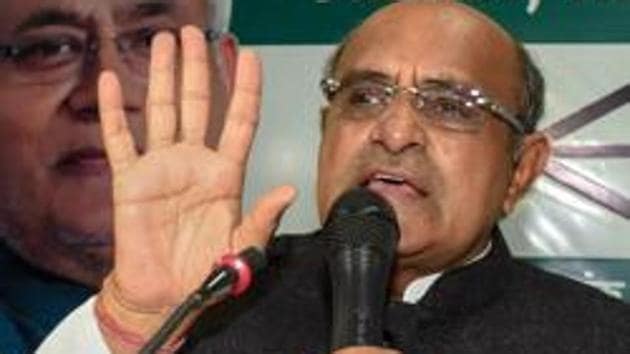‘Our Article 370 stand on socialist lines’, says KC Tyagi
The Union government’s decision evoked strong political reactions; it also witnessed unexpected support from parties such as the Bahujan Samaj Party, the Telangana Rashtra Samithi, and the Aam Aadmi Party.
The Centre’s decision to revoke Article 370, which accorded a special status to Jammu and Kashmir (J&K), has finally put an end to last week’s speculation over the prevailing political situation in the state (now a Union Territory). Responding to last week’s rumours on the state of play, the first Sadar-i-Riyasat of J&K, and senior Congress leader, Karan Singh, requested the people to maintain calm, and called upon the Centre to come clean on its plans for the state. Singh also urged the Centre to handle Articles 35A and 370 cautiously. This statement was as relevant as the one made by his father, Maharaja Hari Singh, who agreed to accede J&K to the Dominion of India in 1947.

The Union government’s decision evoked strong political reactions; it also witnessed unexpected support from parties such as the Bahujan Samaj Party, the Telangana Rashtra Samithi, and the Aam Aadmi Party.
As far as Janata Dal(United) is concerned, our view on the issue is based on the political legacy of top socialist leaders such as JP Narayan, Ram Manohar Lohia, and George Fernandes. They had hailed the decision of National Conference when Sheikh Abdullah, the second prime minister of J&K, refused to be a part of Pakistan by calling it a theocratic State, and accepted Mahatma Gandhi’s secular India.
Later, when Sheikh Abdullah was dismissed in 1953, and jailed by the Jawaharlal Nehru government, Lohia and JP opposed his detention. Lohia sent two of his associates to visit Abdullah at the Kodaikanal guest house in Tamil Nadu.
On May 1, 1956, JP wrote to Nehru: “I do earnestly wish that this question be considered more from a human, rather than a nationalist, point of view. All men have to live upon this earth as brothers, irrespective of what national frontiers divide them”.
In a letter to Hindustan Times on February 1, 1972, JP wrote: “When rumours were thick in Delhi in the first week of January, 1971, that some action was imminent against Sheikh Abdullah and some of his colleagues aimed to deny them the opportunity of participating in the last Lok Sabha elections, I had raised my voice of protest and also pleaded personally with the Prime Minister and Mr. P.N. Haskar.”
He termed this denial unfortunate since it could have been a golden opportunity for Sheikh Abdullah and his people to re-enter into the mainstream politics of India after 18 years. He was convinced that Sheikh Abdullah would be agreeable to his state remaining within the Indian Union, irrespective of Pakistan’s wishes.
JP kept agitating for his release, and also wrote a letter to Indira Gandhi on June 23, 1966. In that letter, he mentioned that “if there is any chance of this matter being settled, it is with the help of Sheikh Abdullah”. Lohia too regarded Sheikh Abdullah as a secular leader.
Moreover, JP was one of the few leaders to support Article 370 when it was attacked during the Congress’ regime, and attempts made to dilute it.
The JD(U) inherits this legacy of JP, Lohia, and Fernandes. All three were opposed to tinkering with Article 370. The Centre’s decision to revoke Art 370 might give birth to discontent among the people of the state. Socialist parties have always preferred the politics of confidence, and never opted to impose views. Later in the VP Singh government, Fernandes was appointed special minister to revive the political process in J&K. He visited Kashmir on March 11, 1990, as the minister of Kashmir issues, and handled the crisis sensibly.
However, I am not surprised by the Centre decision. This had been on the agenda of the Bharatiya Janata Party (BJP), and its predecessor, the Jan Sangh. It is important to note here that when the resolution on the Kashmir accession to the Indian Union was moved by Sardar Patel, it was supported by all Union ministers, including Syama Prasad Mookerjee. We, as the National Democratic Alliance partners, decided not to touch sensitive issues such as the Universal Civil Code, the Ram Mandir issue, and Article 370, to avoid confrontation among coalition partners.
On Kashmir, JD(U) president Nitish Kumar is carrying forward the legacy of JP, Lohia, and Fernandes. Our commitment to that philosophy is well known to our coalition partner also.
Get World Cup ready with Crick-it! From live scores to match stats, catch all the action here. Explore now!
See moreGet Current Updates on India News, Elections 2024, Lok sabha election 2024 voting live , Karnataka election 2024 live in Bengaluru , Election 2024 Date along with Latest News and Top Headlines from India and around the world.



